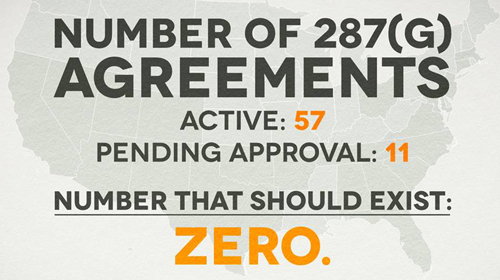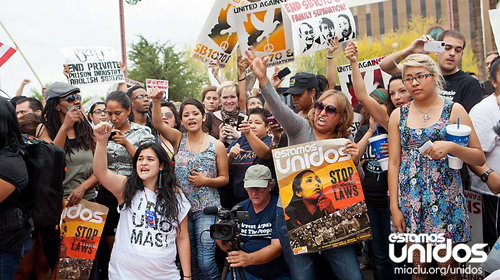Petitions, Sign-on Letter Sent to Administration Calling for End to Controversial Immigration Program


Communities across the country are saying no to 287(g), the controversial Immigration and Customs Enforcement (ICE) program that delegates immigration enforcement authority to participating law- enforcement agencies.
Op-eds advocating for an end to 287(g) have been published in newspapers in Maryland, Florida, and South Carolina. Sheriffs in Massachusetts are deciding they want nothing to do with 287(g). Sign-on letters have been sent and phone calls made to local, state, and federal officials, urging an end to this ineffective program. And just yesterday, the ACLU affiliate in Tennessee issued a report that provides a comprehensive look at the problems with 287(g) over five years in Nashville.

Additional Advocacy
A Congressional Quad-Caucus letter sent yesterday calling for the end of 287(g).
Earlier this week, to coincide with Human Rights Day, ACLU specifically mentioned 287(g) in its submission to the International Covenant on Civil and Political Rights, calling on the organization to hold the U. S. accountable to its human rights promises and dispense with this odious program, among others.
We want to highlight two more pieces of national advocacy calling for an end to these practices: A national sign-on letter sent earlier this week to ICE and the Department of Homeland Security (DHS) and a petition containing more than 4,500 signatures that will be delivered today to the White House. Nearly all of the 287(g) agreements are set to expire on or around Dec. 31 unless renewed by ICE. We strongly urge the administration to terminate the entire program and make 2013 a year that’s 287(g)-free.
Sign-On Letter
The ACLU, joining with more than 160 organizations and groups across the country in a letter sent earlier this week, has called on the administration to once and for all end 287(g).
The 287(g) program has been sharply criticized by DHS’s own inspector general, the Government Accountability Office and the Migration Policy Institute.
These organizations rightly note that agreements are susceptible to racial profiling, fail to prioritize public safety threats, and waste money. Furthermore, 287(g) is not only fiscally irresponsible, it’s also unnecessary – unauthorized immigration rates and border apprehensions have plummeted to the lowest level in 40 years, and new census data released last week confirm a sustained drop in unauthorized immigration.
Our letter calls on DHS Secretary Janet Napolitano and ICE Director John Morton to terminate all existing 287(g) agreements and reject all pending applications. As it states, “ending the 287(g) program will ensure uniform immigration enforcement, and will help reduce the targeting of Latino communities.”
Petitions
As the Supreme Court was hearing arguments in the Arizona SB 1070 case, the ACLU organized a nationwide campaign called Estamos Unidos, to engage Latino communities nationwide on these issues.
We wrapped a minibus in the Estamos Unidos campaign colors, and set out from California to Arizona, where we joined community protests as the Supreme Court heard the arguments in the case. From there, we traveled across New Mexico and Texas, then on to Louisiana. There we met community leaders who had helped rebuild New Orleans after Hurricane Katrina, only to become the targets of discrimination and overly aggressive policing as a result of collaboration between police and immigration agents. One man showed us a sign from a recent rally that said “stop poli-migra” – the linking of police and immigration enforcement, which undermines the safety and trust of the community.
We moved on to Alabama, Georgia and South Carolina, three states with SB 1070-type laws and 287(g) agreements, and then up to Illinois, and across the Great Plains and Rockies back to California. In the small town of Carbondale, Colorado, high up in the Rockies, we met with youth and community leaders who initially came together when the school resource officer was found to be collaborating with immigration officials.
Over 8,000 miles, we traveled through three types of communities, some of which overlap:
- SB 1070-type communities where state laws specifically require police and local law enforcement to act as immigration agents,
- 287(g) communities where local police and sheriffs enter into special enforcement agreements with immigration officials, and
- Everywhere else where Secure Communities is in effect, where simple things like a DUI checkpoint become a place of fear – not for fear of being drunk, but for being an immigrant.
As we traveled, people—4,584 in all—put their names down on a petition to President Obama, urging him to stand with immigrant communities and stop state anti-immigrant laws like SB 1070 and federal programs that involve local police and sheriffs in immigration enforcement. We are proud to deliver these petitions today to the president and the White House. We are united. Estamos Unidos.
Learn more about anti-immigrant laws: Sign up for breaking news alerts,follow us on Twitter, and like us on Facebook.

